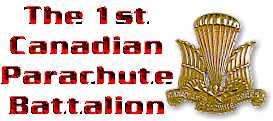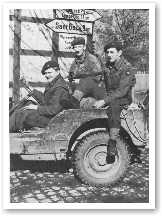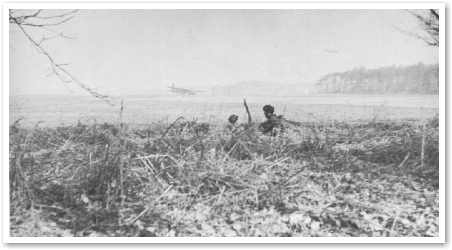
The paratroopers landed between 0100 and 0130 hours on June 6th. Due to
primitive navigation aids, dead reckoning, and anti-aircraft fire, the groups were
dispersed over a somewhat wider area than had been anticipated. The dispersal on the drop
resulted in the loss of most of the Battalion's heavy equipment along with 80 men who were
taken prisoner. The First Canadian Parachute Battalion was the first Canadian unit on the
ground in France.
In spite of those handicaps, all objectives were rapidly attained; a tribute to
the hardiness of the men, the excellence of their training, and the thoroughness of the
briefing they had received. The battalion continued to fight, with great success in France
seeing action in the following places: La Vallee Tantot (August 21), La Haie Tondue,
Bonneville sur Tonques, Vauville and Beuzeville, where the enemy had again withdrawn
leaving the town to the Allies. The Battalion rested there for the next few days until the
remainder of the Brigade moved into the area. They returned to England on 7 September,
1944.
 |
On Christmas Day, 1944, the battalion departed
Folkestone for Ostend, Belgium, on the S.S.Canterbury.
On January 2, 1945, they arrived in Rochefort, where the battalion made preparation for battle, only to later
realize with great disappointment, that the enemy had decided to retreat. They moved to Pondrome on
January 18th, for a four day rest, before moving to the Dutch Village of Roggel. Upon arrival, the Battalion moved
up to its assigned sector in order to set up defensive
positions as patrolling began immediately. |
The particular type of patrol activity was a favorite among the men, as it
required the battalion to harry and alarm the enemy by means of patrols, raids, etc., and
to establish bridgeheads where and when suitable. The Allied Forces had gathered to push
south and destroy German resistance in preparation for the Rhine Crossing. The heavy
shelling of battalion positions resulted in very few casualties considering the length of
time they were there and the strength of the enemy positions. The battalion maintained an
active defense as well as considerable patrol activity until its return to the United
Kingdom on February 23rd, 1945.
On March 7, 1945, the battalion returned from leave to start training for what
would be the last major airborne operation of the war: Operation Varsity, the crossing of
the Rhine.





